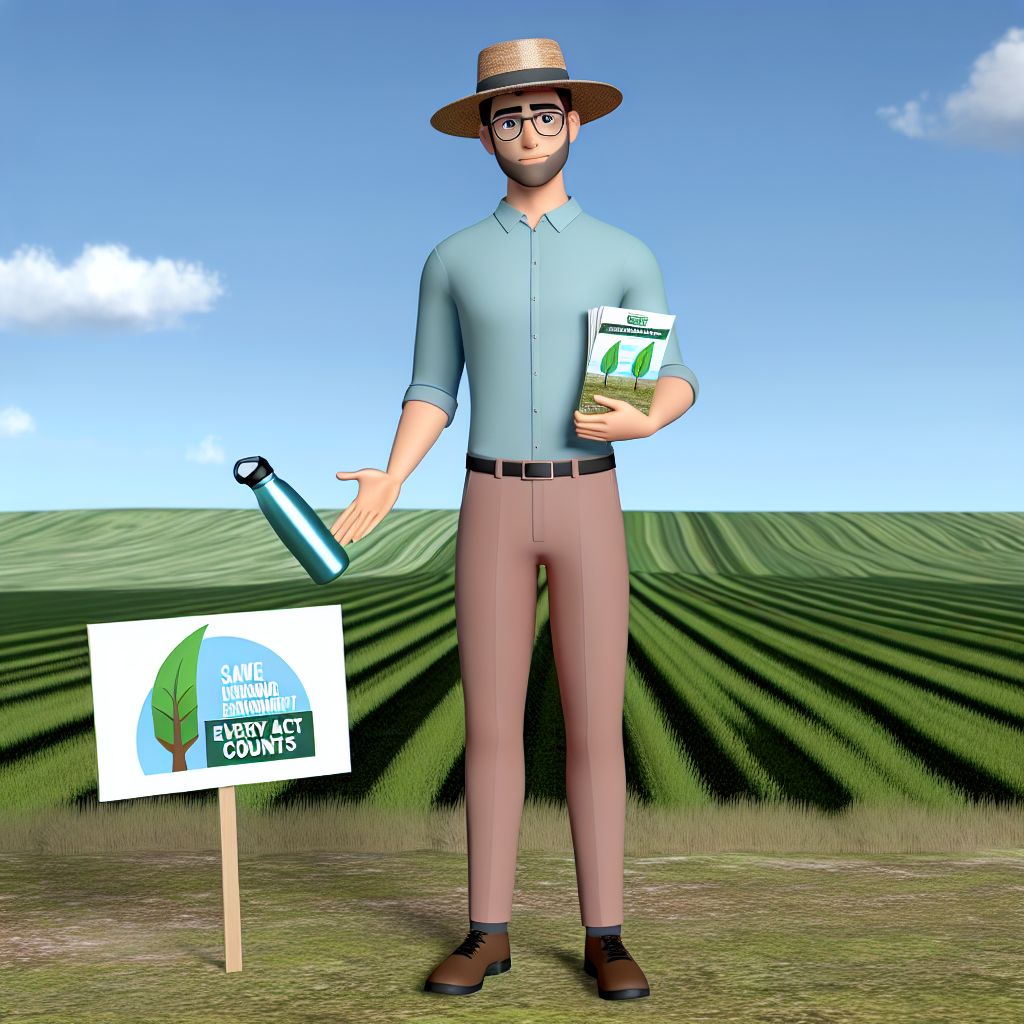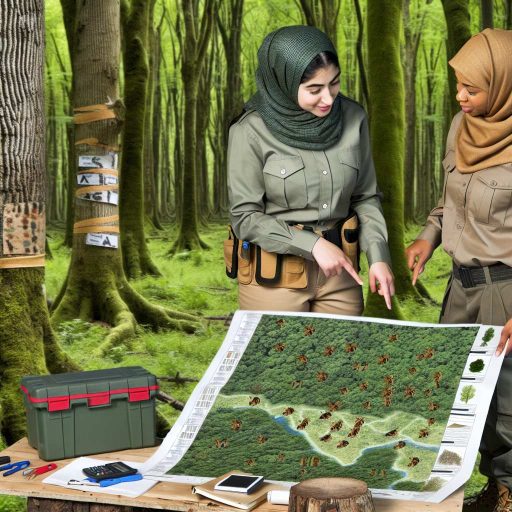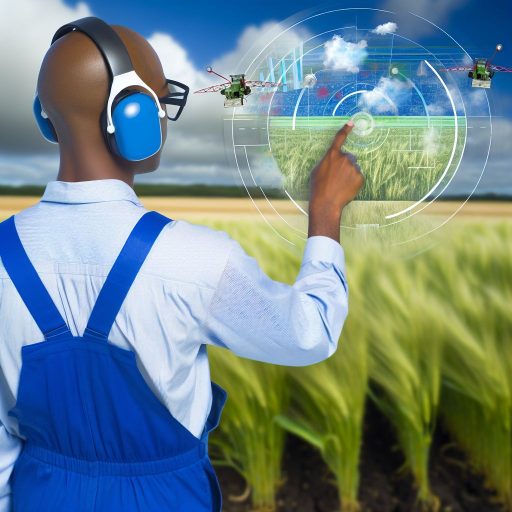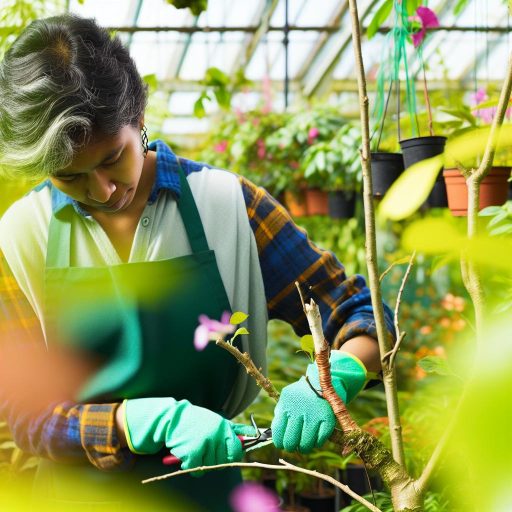Introduction:
Extension agents play a crucial role in promoting environmental stewardship by working closely with communities.
Environmental stewardship is vital for preserving natural resources and maintaining a healthy ecosystem.
These agents engage with communities to educate and encourage sustainable practices for a greener future.
Extension Agents and Their Role
Extension agents are professionals who work for cooperative extension services.
These services are partnerships between state land-grant universities and the United States Department of Agriculture.
They serve as a bridge between research institutions and the public.
Extension agents provide science-based information to help individuals make informed decisions.
Role in Educating Communities
Extension agents play a vital role in educating communities about best agricultural practices.
They also focus on environmental conservation and sustainable resource management.
Extension agents conduct workshops, seminars, and field demonstrations.
They provide one-on-one consultations to address specific issues faced by farmers and other stakeholders.
Working with Agricultural and Environmental Issues
Extension agents work closely with farmers to improve production methods.
They enhance crop yields and reduce the use of harmful chemicals.
Extension agents assist in implementing conservation practices.
These practices include soil erosion prevention, water management, and habitat restoration.
Training and Qualifications
To become an extension agent, individuals typically need a bachelor’s degree in agricultural sciences.
Degrees in environmental science or related fields are also acceptable.
Some positions may require a master’s degree or specialized certifications.
Extension agents must undergo training in effective communication and outreach strategies.
This training helps them engage with diverse audiences effectively.
Transform Your Career Today
Unlock a personalized career strategy that drives real results. Get tailored advice and a roadmap designed just for you.
Start NowOverall, extension agents play a critical role in promoting environmental stewardship.
They support sustainable agriculture practices within communities.
Their expertise and dedication help ensure a healthy environment for future generations.
Environmental stewardship plays a crucial role in the preservation of natural resources.
By taking care of our environment, we are ensuring that these resources are available for future generations.
Significance of Environmental Stewardship
- Promotes sustainability by conserving resources
- Protects biodiversity and ecosystems
- Reduces pollution and the impact of climate change
- Ensures a healthy environment for all living beings
Extension agents play a key role in promoting environmental stewardship by educating communities on sustainable practices.
They help them implement these practices in their daily lives.
Impact on Future Generations
- Ensures that resources are available for future use
- Creates a healthy and thriving environment for future generations
- Reduces the risk of environmental disasters for future generations
When extension agents work with communities to address environmental issues, they are helping to create a more sustainable future for all.
Examples of Environmental Issues Addressed by Extension Agents
- Water conservation and management
- Soil health and erosion prevention
- Waste management and recycling
- Air quality improvement
- Biodiversity conservation
Through their work, extension agents play a vital role in addressing these environmental issues and promoting a more sustainable way of life for all.
You Might Also Like: Famous Entomologists Who Changed Agricultural Practices
Collaboration with communities
Extension agents play a crucial role in working with farmers, businesses, and local governments to promote environmental stewardship.
Through collaboration, they are able to make significant impacts on sustainability efforts.
- Working with farmers: Extension agents provide farmers with the latest information on sustainable farming practices, helping them adopt environmentally-friendly methods.
- Engaging with businesses: Extension agents collaborate with businesses to implement practices that reduce environmental impact and promote sustainability in their operations.
- Partnering with local governments: Extension agents work closely with local governments to develop policies and programs that support environmental conservation and stewardship.
Importance of building partnerships
Building partnerships is essential for extension agents to effectively promote environmental stewardship.
By working together with various stakeholders, they can leverage resources and expertise to create lasting positive change.
- Resource sharing: Partnerships allow for the sharing of resources such as knowledge, funding, and equipment, making it possible to implement more comprehensive and impactful environmental initiatives.
- Expertise and skills: Collaborating with diverse partners brings together a range of expertise and skills, enabling extension agents to address complex environmental challenges more effectively.
- Community engagement: Partnerships help foster community engagement and ownership of environmental stewardship efforts, leading to sustainable practices that are embraced by local residents.
Examples of successful community initiatives
Extension agents have led numerous successful community initiatives that promote environmental stewardship.
These initiatives showcase the positive outcomes that can be achieved through collaborative efforts.
- Community gardens: Extension agents have helped establish community gardens in urban areas, providing residents with access to fresh produce while promoting sustainable gardening practices.
- Waste reduction programs: Extension agents have worked with local businesses to implement waste reduction programs, resulting in decreased environmental impact and cost savings.
- Water conservation projects: Extension agents have partnered with local governments to educate communities on water conservation practices, leading to reduced water usage and preservation of local water resources.
Collaboration with communities is essential for extension agents to promote environmental stewardship effectively.
By working with farmers, businesses, and local governments, building partnerships, and leading successful community initiatives, extension agents can make a significant impact on sustainability efforts and create a more environmentally-conscious society.
Transform Your Career Today
Unlock a personalized career strategy that drives real results. Get tailored advice and a roadmap designed just for you.
Start NowUncover the Details: Agricultural Technician Work Environments
Education and Outreach
Extension agents educate communities on sustainable practices through workshops and training sessions.
They emphasize the importance of proper waste disposal, water conservation, and energy efficiency.
Extension agents collaborate with local schools to teach students about environmental stewardship.
They work with community groups to spread awareness about the benefits of sustainable living.
Resources and Tools
Extension agents use online resources such as webinars, videos, and social media to reach a wider audience.
They distribute educational materials like brochures, pamphlets, and posters to disseminate information.
Agents utilize interactive tools like carbon footprint calculators and energy consumption trackers to engage communities.
They partner with local businesses to promote eco-friendly products and services to consumers.
Role of Workshops, Events, and Demonstrations
Workshops provide hands-on learning experiences for community members to understand sustainable practices better.
Events like Earth Day celebrations and environmental fairs raise awareness about environmental issues and solutions.
Demonstrations showcase practical ways to reduce waste, conserve energy, and protect natural resources.
These activities create a sense of community involvement and empowerment towards environmental stewardship.
Learn More: Agricultural Economists’ Role in Agricultural Policy Reform
Sustainable agriculture is a crucial aspect of environmental stewardship. Extension agents play a significant role in helping farmers implement sustainable agricultural practices.
How Extension Agents Help Farmers Implement Sustainable Agricultural Practices
- Provide education and training on sustainable farming methods
- Offer technical assistance and resources for sustainable agriculture
- Facilitate partnerships with government agencies and environmental organizations
Extension agents work closely with farmers. They ensure farmers have the knowledge and tools needed. This helps in transitioning to sustainable practices. By promoting sustainable agriculture, extension agents help farmers improve soil health. They also help conserve water resources and reduce pollution from chemical inputs.
Benefits of Sustainable Agriculture for the Environment and Economy
- Preserves natural resources such as soil and water
- Reduces greenhouse gas emissions and mitigates climate change
- Improves biodiversity and supports ecosystem health
- Enhances food security and promotes economic stability
Sustainable agriculture benefits the environment. It protects natural resources and reduces carbon emissions. It contributes to economic resilience by creating jobs. Additionally, it increases farm profitability and enhances market opportunities for sustainable products.
Case Studies of Successful Sustainable Agriculture Projects Led by Extension Agents
- Integration of cover crops to improve soil health and water retention
- Adoption of conservation tillage practices to reduce erosion and runoff
- Implementation of agroforestry systems to enhance biodiversity and carbon sequestration
Extension agents have been instrumental in implementing successful sustainable agriculture projects. These have resulted in tangible environmental and economic benefits. By showcasing these case studies, they inspire other farmers. This encourages them to adopt sustainable practices and contribute to a more sustainable future for agriculture.
See Related Content: The Impact of Climate Change on Food Science

Addressing environmental challenges
Identifying common environmental challenges faced by communities is crucial for extension agents in order to effectively address these issues.
Transform Your Career Today
Unlock a personalized career strategy that drives real results. Get tailored advice and a roadmap designed just for you.
Start Now- Climate change
- Water pollution
- Deforestation
- Loss of biodiversity
Extension agents play a significant role in finding solutions to these challenges. They work closely with community members, government agencies, and other stakeholders.
They conduct workshops, seminars, and training sessions to raise awareness about environmental issues and promote sustainable practices.
Extension agents provide technical assistance and guidance to help communities implement sustainable solutions.
This includes promoting conservation practices, adopting eco-friendly technologies, and implementing waste management strategies.
Role of research and innovation
Research and innovation play a critical role in overcoming environmental issues.
Extension agents collaborate with researchers, scientists, and experts to develop innovative solutions.
Research helps in identifying the root causes of environmental problems and developing evidence-based solutions.
Innovative technologies, such as remote sensing, GIS mapping, and data analytics, are used to monitor environmental changes.
These technologies assess the impact of human activities on the environment.
They provide valuable insights that help in making informed decisions and designing effective strategies.
Furthermore, research helps in exploring new approaches and best practices for sustainable environmental management.
Extension agents use research findings to educate communities to take proactive measures.
By promoting research-based solutions, extension agents can make a significant impact in improving environmental quality.
They also promote sustainability throughout their communities.
Advocacy and policy
Extension agents play a crucial role in advocating for environmental policies at both the local and national levels.
They serve as intermediaries between the scientific community, policymakers, and the public.
These agents provide valuable insights and recommendations based on their expertise and research.
Their primary goal is to ensure that policies are founded on scientific evidence.
These policies must be in the best interest of environmental conservation and sustainability.
Transform Your Career Today
Unlock a personalized career strategy that drives real results. Get tailored advice and a roadmap designed just for you.
Start NowExtension agents actively engage with stakeholders, including government officials and community members.
They raise awareness and promote environmentally responsible practices.
One way extension agents advocate for these policies is by sharing their findings through various channels.
These channels include public forums, presentations, and publications.
They leverage their knowledge to influence decision-makers.
This, in turn, shapes policies that align with best practices in environmental stewardship.
Importance of policy in promoting environmental stewardship
Policy plays a critical role in promoting environmental stewardship.
It establishes guidelines, regulations, and incentives for sustainable practices.
This framework addresses environmental challenges, setting goals and measuring progress.
Effective policies can drive positive change by incentivizing investments in renewable energy.
These policies promote waste reduction and safeguard natural resources.
They create a conducive environment for innovation and collective action.
This is essential to address pressing environmental issues like climate change and pollution.
Moreover, policies hold stakeholders accountable for their environmental impact.
They ensure compliance with regulations that promote sustainability and ethical standards.
These policies serve as a means of enforcement and monitoring.
They ensure that environmental stewardship practices are implemented across various sectors.
Examples of environmental policies influenced by extension agents
- Water conservation policies: Extension agents have played a key role in advocating for water conservation policies.
- They promote efficient irrigation methods, rainwater harvesting, and watershed management.
- Land use regulations: Extension agents have influenced land use policies that protect biodiversity.
- These regulations prevent deforestation and promote sustainable agriculture practices.
- Climate change mitigation strategies: Extension agents advocate for policies that reduce greenhouse gas emissions.
- These policies also promote renewable energy sources and support initiatives to combat climate impacts.
- Waste management policies: Extension agents shape waste management policies that prioritize recycling and reducing plastics.
- Sustainable agriculture policies: Extension agents influence agricultural policies that encourage eco-friendly farming and soil conservation.
By actively participating in policy advocacy, extension agents contribute to implementing environmentally sound practices.
Transform Your Career Today
Unlock a personalized career strategy that drives real results. Get tailored advice and a roadmap designed just for you.
Start NowTheir work is essential in fostering a culture of environmental stewardship.
This approach benefits present and future generations on a local, national, and global scale.
Role of Extension Agents in Environmental Stewardship
Extension agents play a vital role in promoting environmental stewardship in communities.
They provide valuable resources, education, and support to help individuals and organizations make sustainable choices.
By working closely with community members, extension agents can address environmental challenges, implement conservation practices, and foster a sense of responsibility towards the environment.
It is essential to recognize the dedication and expertise of extension agents in creating a healthier and more sustainable future for all.
Their efforts contribute to a more environmentally conscious society and a better quality of life for present and future generations.
Readers should support and engage with extension agents in their communities.
By participating in programs, workshops, and initiatives led by extension agents, individuals can learn how to make a positive impact on the environment and become advocates for sustainable practices.
Together, we can work towards a greener and more sustainable future, with the guidance and support of extension agents dedicated to promoting environmental stewardship in every community.
Additional Resources
Regional … – Montana State University Employment Opportunities




